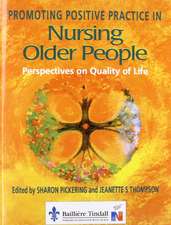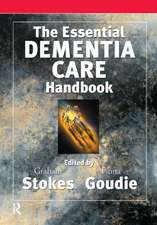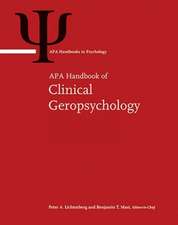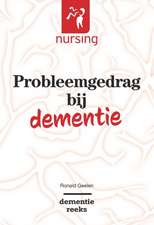End-Stage Dementia Care: A Basic Guide
Autor C. R. Kovachen Limba Engleză Hardback – noi 1996
| Toate formatele și edițiile | Preț | Express |
|---|---|---|
| Paperback (1) | 194.33 lei 6-8 săpt. | |
| Taylor & Francis – noi 1996 | 194.33 lei 6-8 săpt. | |
| Hardback (1) | 326.58 lei 6-8 săpt. | |
| Taylor & Francis – noi 1996 | 326.58 lei 6-8 săpt. |
Preț: 326.58 lei
Preț vechi: 343.77 lei
-5% Nou
Puncte Express: 490
Preț estimativ în valută:
62.50€ • 65.17$ • 51.94£
62.50€ • 65.17$ • 51.94£
Carte tipărită la comandă
Livrare economică 20 martie-03 aprilie
Preluare comenzi: 021 569.72.76
Specificații
ISBN-13: 9781560325147
ISBN-10: 1560325143
Pagini: 256
Ilustrații: illustrations
Dimensiuni: 152 x 229 x 16 mm
Greutate: 0.63 kg
Ediția:1
Editura: Taylor & Francis
Colecția Taylor & Francis
Locul publicării:Oxford, United Kingdom
ISBN-10: 1560325143
Pagini: 256
Ilustrații: illustrations
Dimensiuni: 152 x 229 x 16 mm
Greutate: 0.63 kg
Ediția:1
Editura: Taylor & Francis
Colecția Taylor & Francis
Locul publicării:Oxford, United Kingdom
Cuprins
Part 1 Foundations and Options for Program Development; Chapter 1 Stages of Dementia, Mary Cohan; Chapter 2 Palliative Care for Late-Stage Dementia, Sarah A. Wilson; Chapter 3 Maintaining Personhood, Christine R. Kovach; Chapter 4 Administration of a Late-Stage Dementia Program in the Nursing Home Setting, Patricia E. Noonan, Sandra A. Stearns; Part 2 Treatment Approaches for Common Needs; Chapter 5 Medical Care During Late-Stage Dementia, Edmund H. Duthie; Chapter 6 Treatment Approaches to Common Physical Care Needs, Thelma J. Wells; Chapter 7 Strategies for Eating, Swallowing, and Dysphagia, Judith I. Kulpa, Roxanne DePaul; Chapter 8 A Supportive Environment for People With Late-Stage Dementia, Margaret P. Calkins; Chapter 9 Communications and Fundamentals of Care, Carly R. Hellen; Chapter 10 Behaviors Associated With Late-Stage Dementia, Christine R. Kovach; Chapter 11 Psychopharmacology and Late-Stage Dementia Behaviors, Ladislav Volicer, Ann C. Hurley, E. Mahoney; Chapter 12 Therapeutic Activities for Low Functioning Older Adults With Dementia, Jill S. Magliocco; Part 3 Special Issues in Care; Chapter 13 Working With the Family, Marilyn J. Bonjean, Ronald D. Bonjean; Chapter 14 Making Change Work, Janet Wessel Krejci; Chapter 15 Legal and Ethical Issues, Alison Barnes; Chapter 16 Program Evaluation, Marilyn J. Rantz, Mary Zwygart-Stauffacher; Chapter 17 Future Challenges and Considerations, Christine R. Kovach;
Descriere
People with mid-stage dementia are served by special care units in long-term care facilities, although as these residents deteriorate, they are transferred out of the unit and into a general nursing home unit. These nursing homes are not equipped to deal with palliative needs of end-stage dementia care. The book addresses those needs. With this in mind, Part One examines the stages of dementia end-stage in particular. Other chapters in this section provide background on the hospice movement and hospice concepts; the idea of maintaining personhood; and administration of a late-stage care unit. Part Two focuses on treatment approaches for common needs in end-stage dementia - medical and physical care; a supportive environment; the fundamentals of care; psychopharmacology; and therapeutic activities. Part 3 contains chapters on family-centred care; legal and ethical issues; programme evaluation; and future opportunities.























